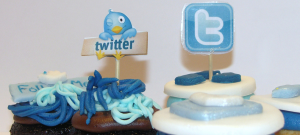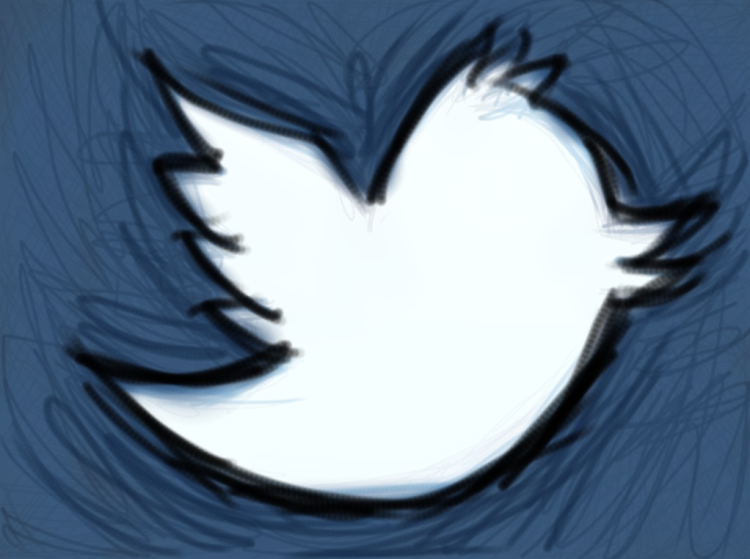When Facebook went public over a year ago, the stock fell flat on its face before recently surging with strong mobile results. But when LinkedIn went public, the stock doubled and has risen slowly but steadily ever since.
The question is: Which model will Twitter follow?
I chatted with Steve Beck, a managing partner at CG42, which works with business that are growing — and businesses that are stagnating — to get his opinion. And — with Twitter’s user growth somewhat stagnating — it turns out that both sides of that consulting are relevant.
Overall, Beck is bullish on Twitter’s long-term growth prospects, and thinks that the IPO will likely be a good one, and go well for the company.
But he also sees a lot of potential potholes along the path.

Above: Twitter cupcakes. These were not part of the IPO filing, though.
VentureBeat: What were your initial thoughts on seeing Twitter’s S-1 documentation?
Steve Beck: The filing confirmed a lot of what we suspected: The userbase is strong, even if the growth rate is a little lower than people expected, the revenue side looks interesting, and the profit side was not unexpected.
The biggest risk is how they’re going to deal with their userbase and unique counts. The challenge is that advertisers tend to want to know that they’re really hitting eyeballs … real people.
VentureBeat: What do you mean by that?
Beck: For instance, Facebook has a fairly well-categorized way of organizing its accounts: people and brands. Twitter doesn’t have the same kind of differentiation. It’s a philosophical difference in the companies’ approaches to how they treat identity.
So there’s a clear difference in terms of the authentication of how unique users are calculated … there’s a wide range of everything from robotic twitter feeds down to spammers and programmed accounts, and very legitimate multiple accounts from a single person.
Twitter allows multiple accounts, and over its history, that’s clearly not a problem, but when you think about Twitter as a business … advertisers like to know that the people to whom they’re advertising are real buyers.
VentureBeat: But you’re still positive about the IPO?
Beck: Yes, I think this is an attractive media property, an attractive IPO, and that Twitter is doing some wonderful things in media and in mobile.
 VentureBeat: Where does this IPO fit in recent history?
VentureBeat: Where does this IPO fit in recent history?
Beck: It certainly fits right up there — you have to put it in the same breath as Facebook and LinkedIn. Of course, LinkedIn is different because of its niche and the attractiveness of that niche to advertisers.
And between Facebook and Twitter … the revenue side is a little different.
But they’re very similar in terms of the upside opportunity, in terms of the health of the brands, and that fact that they both reach out not just to those in technology circles but to the broader arena of consumers.
I do also believe though, that like Facebook has had to grow up very publicly … you’re going to see the same thing of Twitter. When you’re public, the challenges are different. So far, Facebook has continued to successfully balance the user experience with its very aggressive quarterly growth goals.
That will be a challnege for Twitter as well, because the one thing that each of these properties has as a challenge is that if the user experience erodes, people will move on.
VentureBeat: Seventy-seven percent of Twitter’s users are international users who bring in only 25 percent of its revenue. Problem?
Beck: You can look at that in one of two ways: as growth potential over time, or as a current challenge.
From my perspective you’d have to be considering this as a long-term play, and view the international presence of the brand as a good thing that ultimately should contribute to Twitter being able to grow its business on a broader basis.
Are there challenges? Absolutely!
 VentureBeat: Why did Twitter go public now, as opposed to next year?
VentureBeat: Why did Twitter go public now, as opposed to next year?
Beck: I refuse to answer that question on the basis that I don’t have an answer (laughing). I’m not sure … unlike Facebook which was required to go public because of the investment side, Twitter could have taken longer.
VentureBeat: Were you surprised, as some were, that Twitter’s user growth numbers are not higher?
Beck: Yes and no … Twitter certainly has made its way into the popular culture, and we’re even starting to see some backlash there.
But, as an organization that helps other companies drive organic growth, I work with companies that have stagnated or started to decline, and the different between enthusiasts and the general public is huge.
The benefit of being part of LinkedIn is very clear. The benefit of being part of Facebook is very, very clear. The benefit of being on Twitter is … not so obvious.
VentureBeat's mission is to be a digital town square for technical decision-makers to gain knowledge about transformative enterprise technology and transact. Learn More

